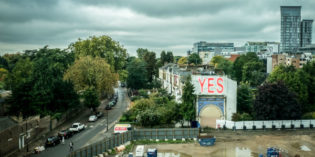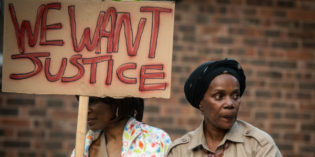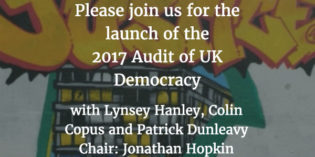Building sub-national government

How the planning system lets homeowners overwhelm the broader public interest
Britain needs more housing, especially in the South East, yet the green belt still enjoys a great deal of protection from development. John Sturzaker (University of Liverpool) looks at the difficulty of establishing whether NIMBYism is motivated by self-interest or legitimate concerns – and the imbalance of power between people who need housing, and those […]

Outside the south-east, Britain’s towns are struggling to hold on to their young people
Many of Britain’s towns are shrinking; big-city Britain is largely thriving. Taking south Wales as an example of these divisions, Ian Warren explains why his new Centre for Towns will advocate for the future of our towns, particularly during a period when both major parties in the UK parliament appear committed to city regions. Merthyr Tydfil, […]

Why is the North so hard to govern?
Devolution has evolved into an uneven process, with much greater progress achieved in some parts of the country compared to others. But why is the North so difficult to govern? John Fenwick (Northumbria University) offers some explanations, and points to the north-east in particular as an area with a strong sense of regional identity but fluctuating, unclear […]

Brexit has blown open the unreconciled divisions in Northern Ireland
The British and Irish governments have long tried to keep a lid on the tensions in Northern Ireland. But Brexit, argues Duncan Morrow (Ulster University) has exposed the weaknesses of the Good Friday and St Andrew’s Agreements – deals that never required each side to give up their aims of ruling Northern Ireland alone. Now […]

Broken up and hollowed out: how the north-east lost its powers and influence
Following its heyday of political influence during the New Labour era, the north-east has seen much of its regional democracy decline or disappear – with the loss of 13 councils, nearly 500 councillors and the North East Assembly. Sue Regan, Fred Robinson and Keith Shaw have examined the approximately 100 elected and unelected bodies that […]

‘Your tenants are gay, get over it!’: how housing services discriminate against LGBT+ people
Are public services delivering equality for LGBT+ people? In a socially progressive society like the UK, the presumption is that they probably are. But Peter Matthews and Chris Poyner‘s research suggests some very basic steps are still required to deliver equality, notably in Scottish housing and homelessness services. Pride march in Glasgow, 2010. Photo: Pride Glasgow via a […]

Neighbourhood Forums: six years old, and less powerful than they thought they might be
Created by the Localism Act in 2011, Neighbourhood Development Plans were hailed as a way to give local people more say in planning issues. But some of the conflicts that have ensued between Neighbourhood Forums and local councils show how difficult it is to shift power downwards, writes John Sturzaker (University of Liverpool). Cases in […]

Grenfell’s lessons for democracy: listen to our podcast
On 12 October the author Lynsey Hanley, Conservative London Assembly Member Shaun Bailey, Prof Colin Copus, Prof Patrick Dunleavy and campaigner Clare Coatman launched our 2017 Audit of UK Democracy at the LSE with a discussion of the Grenfell Tower fire. What lessons does the disaster hold for the way local government functions, for regulation […]

Join us at the LSE for the launch of our 2017 Audit of UK Democracy
On Thursday 12 October at 6.30pm Democratic Audit is launching our 2017 Audit of UK Democracy at the LSE with a discussion of the Grenfell disaster’s lessons for local government, public housing and social justice. Speakers include Lynsey Hanley, the author of Estates: An Intimate History, Prof Colin Copus and Prof Patrick Dunleavy, the co-director of Democratic […]



 Democratic Audit's core funding is provided by the Joseph Rowntree Charitable Trust. Additional funding is provided by the London School of Economics.
Democratic Audit's core funding is provided by the Joseph Rowntree Charitable Trust. Additional funding is provided by the London School of Economics.